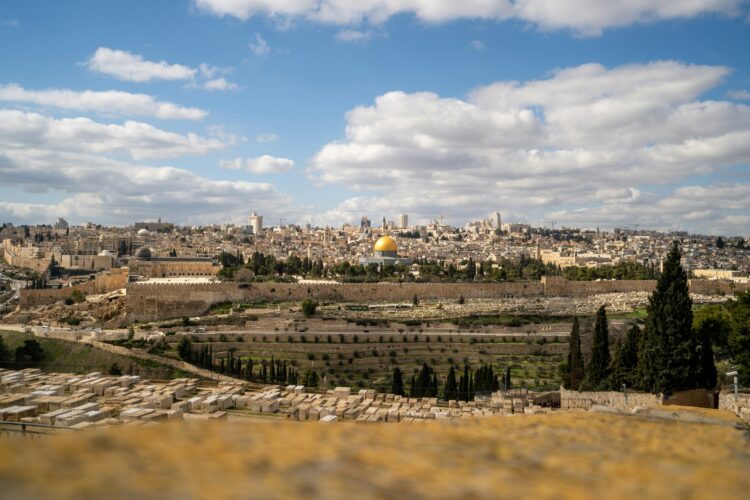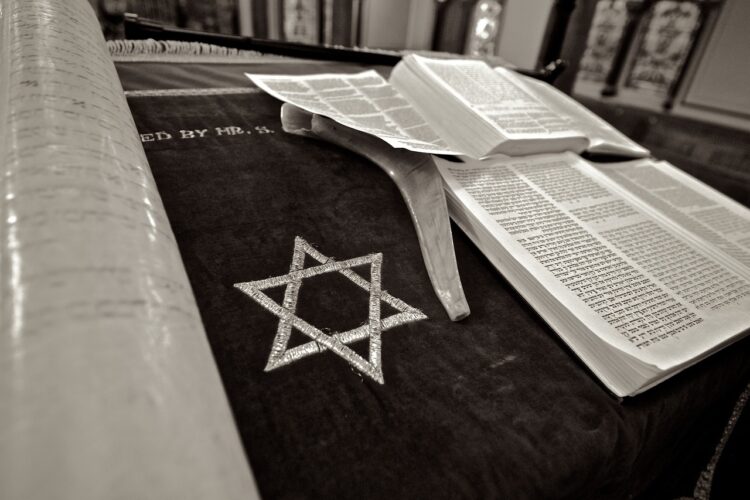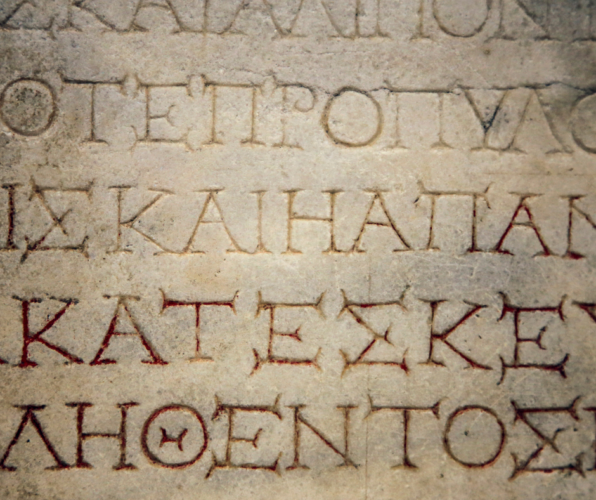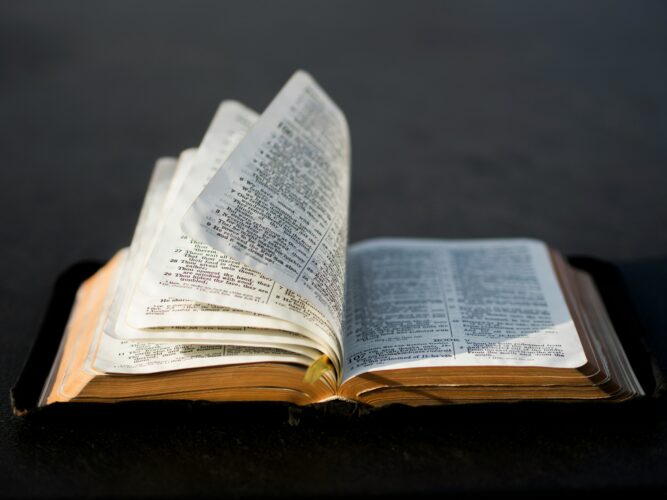Why this title? Did I hit a special repeat bar on my computer keyboard? No, it was my emphasis. Rather, this repeat shows my emphasis and my sorrow that much of today’s Church does not understand, embrace, or establish the courts of the Church. I use the term “church” to include Messianic Jewish congregations, but I use the term because I am speaking to the larger Body of the Messiah. Proverbs 119:136 says, “Stream of water runs down from my eyes because they do not observe your Torah.”
The Torah provides us with a constitution for ancient Israel and principles for all societies. Fair and true courts to adjudicate disputes were foundational to ancient Israel. There was no distinction between religious courts and civil courts. It was one body politic and one court system for all important issues. In the Roman period, Jewish courts were limited and could no longer exact the death penalty. There were categories that could be heard in the religious courts (divorce and remarriage, inheritance, heresy, etc.) and categories that had to be dealt with in Roman civil courts, such as all capital crimes. Jewish courts were still very important, and Yeshua taught that the scribes and Pharisees of the synagogue were a legitimate court sitting in the seat of Moses. The elders of the gate formed Israel’s ancient local judiciary, and then there was appeal to the high priesthood in Jerusalem or their supreme court. In New Testament times, the high court was the Sanhedrin, but courts of the synagogues replaced the elders of the gate. Here are just some of the texts that speak to the issue of courts. You can read as many as you desire.
Bible Justice Texts
You are to do no injustice In judgment. You are not to be partial toward the poor nor show favoritism toward the great, but you are to judge your neighbor with fairness. Lev. 19:15
Deut. 1:16, 17. I commanded your judges at that time, saying ‘hear cases between your brothers and judge fairly between a man and his brother and the outsider with him. You must not show partiality in judgment—you must hear the small and the great alike. Fear no man for the judgment is God’s. The case that is too hard for you, you shall bring to me and I will hear it.
Deut. 17:6. By the mouth of two or three witnesses, the one who is to die is to be put to death. No one is to be put to death by the word of one witness.
Deut. 17:8 Suppose a case is too hard for you to judge, – – over bloodshed, legal claims or assault, matters of controversy within your gates. Then you should go up to the place Adonai your God chooses and come to the Levitical kohanim and the judge in charge at that time.
V.10. “You are to act according to the sentence they tell you from that place Adonai chooses and take care to do all that they instruct you. . . You must not turn aside from the sentence they tell you, to the right or the left. The man who acts presumptuously by not listening to the kohen who stands to serve there before Adonai hour God, or to the judge, that man must die.
Ex. 23. 2, 3. Do not spread a false report. Do not join hands with the wicked by becoming a malicious witness. Do not follow a crowd to do evil. Nor are you to testify in a case, to follow a crowd and pervert justice. On the other hand, nor should you take sides with a poor man in his case.
Deut. 19: 15-21. A single witness shall not rise up; against a person for any offense or sin that he commits. By the word of two or three witnesses is a case to be established. Suppose a hostile witness rises up against someone to accuse him of wrongdoing. Then both people who have the dispute will stand before ADOANI, before the kohanim and judges in charge at that time. The judges are to investigate thoroughly, and if indeed the witness is a false witness and has testified falsely against his brother, then you are do to do him just as he had plotted to do to his brother. So, you will purge the evil from your midst. Those who remain will hear and be afraid, and they will no longer do such an evil thing as this.”
Deut. 25:1 Suppose there is a dispute between people, and they approach the court, the judges hear their case and declare one righteous and the other guilty. You are to justify the righteous and condemn the wicked
Proverbs 18:17 The first to present his case seems right until another comes and cross examines him.
The context for the warning against gossip is to spread accusations and judgments, destroying reputations, and not having recourse to the courts to settle disputes. “You are not to go up and down as a talebearer among your people. You are not to endanger the life of your neighbor. I am Adonai.” Lev. 19:16. Note that the Torah presents mobs agreeing on false testimony together and this is strictly forbidden.
Roman law sometimes was right in its standards for justice and is commended. Festus says, “It is not Roman practice to turn over anyone before the accused meets his accusers face to face and has opportunity to make his defense concerning the charges.” Acts 25:16
Parallel to this is the statement of Nicodemus, “Our Torah doesn’t judge a man unless it first hears from him and knows what he’s doing.
The New Covenant Scriptures present the same orientation to courts, but now they are the courts of the Church. Few realize the context of Matthew 16 where Peter is given the keys. The keys of the Kingdom is the right of judicial decision making. Binding and loosing in Matthew 18 is judicial language. The court binds or forbids and disciplines or looses from penalty. In these two texts, Yeshua is transferring judicial authority from the synagogues and the Sanhedrin to the Apostles and the elders that will be appointed after them.
In the epistles of the New Testament, we see this judicial principle. When elders are appointed, it is understood that they have a foundational judicial function. By the early second century each city had its elders of the city that functioned with a head elder (bishop) as the court of the city for believers.
Ecclesial Courts
While there were different forms in Church history, ecclesial courts were universal in Orthodox, Catholic, and Protestant associations. In the early second century the courts were under the Presbytery of the elders of the city and the bishop. The level of authority between these ecclesial courts and the civil courts varied over the centuries, but in the democratic West the distinction because quite defined. Ecclesial courts had authority over morals and doctrine. They could not weld the sword but could ex-communicate. They could remove from Church leadership and enforce penalties and standards for restoration and inclusion. Crimes were punished by the civil courts. This leaves a large area for church courts. The synagogue maintained the Rabbinic courts or the system of bet din.
As we read in Deut. 25:1, those with a serous dispute were to approach the court and have the dispute settled in the court. The court was to be revered and not reversed by public rebellion. The same standard is presented in I Cor. 6.1-8 where we are told to settle disputes in the community and to choose judges (this would normally be elders) to hear the dispute so that civil courts in non-capital cases would not need to be involved.
I was ordained in the Presbyterian Church over 50 years ago. I was so deeply moved and inspired by the righteous application of these texts. Every local congregation had is eldership that formed a court. Then there was an appeal court in the elders of the city (the Presbytery), and another level of appeal in the Synod (regional representation body) and finally an appeal to the national Permanent Judicial Commission of the General Assembly. We had to learn the judicial processes of the Church for our ordination. When I was elected President of the Union of Messianic Jewish Congregations in 1979, we established that every local eldership was a court for the congregation but there was an appeal to the Judicial Board of the UMJC. As in civil courts, appeal courts decide if there is sufficient grounds for them to hear an appeal.
The Present Chaos
Having abandoned the courts of the Church, especially in independent churches, what do we have? A mess, chaos. There is divorce and remarriage without elders issuing certificates on the grounds for divorce and the right to remarry. One case in Israel involved a former leader who was living with his future second wife before his divorce went through. There was no determination of the legitimacy of his divorce. Now he has divorced the second wife and is in his third marriage “Tell it not in Gath.” Another leader has had a problem with multiple adulteries but is still invited to teach. Another who is very prominent in media teaching is divorced but no determination was made on the legitimacy of his divorce.
Social Media Prosecutions
Finally, we have the huge problem of social media prosecutions. This is a problem for all accusations of gross sin for which there is no civil law violation. The problem is especially bad for accusations of sexual abuse. One is declared a victim prejudging the case, who should be called the accuser. The “Me Too” movement in the secular world now is rampant in the Church, and we are told like in the secular world of a few years back to believe all women. It is true that the overwhelming percent of women who accuse men of abuse are telling the truth, but the Bible says we are not to favor the poor in judgment, and the one claiming abuse may well look like the poor one. But we are not to favor the rich or the poor. And for those who are innocent, it is a terrible advice to believe all women. And we know of cases where false accusation of abuse were made as way of revenge. Media prosecution is bad for the abused who are telling the truth and for the abuser because without witnesses and cross examination, we can never be sure. So, a cloud hangs over both.
We have seen the media prosecution of innocent people. Think of the Duke Lacrosse players that were found innocent or Supreme Court Justice Judge Kavanaugh. What can look so true in social media presentations is later found to be false. But meanwhile reputation are ruined.
But there is another side. The accused can be viscous in response and in some cases the accused has presented testimony on social media to discredit the accuser. A social media battle takes place. Without the courts of the Church, we only have a handful of sand that slips through our fingers. In addition, if there is to be an investigation, it should be subject to the elders’ court to weigh it. The investigator is not the judge but rather the court judges. This is another mistake some make..
Appealing to the Courts
When there is a serious dispute and serious accusations, it is crucial to have recourse to the court. It is best if the people are in an association or denomination that has such courts in place. But if not, a court can be assembled of quality people. For claims of sexual abuse there needs to be an advocate to protect the accuser for it can be traumatic for her to face an abuser. Going privately according to Matthew 18 does not apply in abuse cases. Rather, it has to be brought immediately to elders or in some cases to civil authority (Rape, pedophilia). When a head leader of a congregation or ministry is accused of gross sin, it is too difficult for local elders to handle and such accusations should be handled in a higher court of appeal in the Church (or in civil court if the crime is as stated above).
We are now especially seeing a terrible destruction through media prosecutions of for sexual abuse. We cannot just believe all women, but we have brought shame and injustice on ourselves because we do not insist always that we handle such things in the courts, crimes in the civil courts and all other serious allegations in the courts of the Church. Social media prosecution is sin, the sins of gossip and slander even if the accusations are true. Social media should be limited to naming the accusation and calling for a fair court either in civil or ecclesial authority. This is only when no fair court is offered.
Authority to make the Judicial Determination
The authority to bind and loose, to make the judicial determination, is in the eldership court and once their job is done, their decisions are to be respected. As Torah teaches, there is to be reverence for the court unless there is proof of terrible corruption, bribery etc. The fear of God is connected to the proper fear of his courts.
.
My book Due Process provides more information









